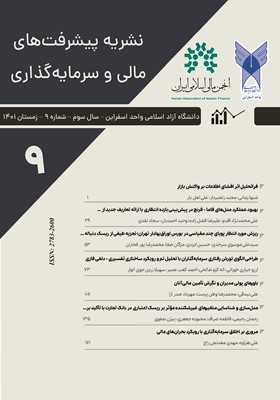Modeling and identification of nonfragile variables affecting credit risk in Tejarat Bank with an emphasis on fintech technologies
Subject Areas : Risk ManagementRahman Rahimi 1 , Fahemeh Sarraf 2 * , Mahboobeh Jafari 3 , Bijan Safavi 4
1 - Department of Accounting, South Tehran Branch, Islamic Azad University, Tehran, Iran.
2 - Department of Accounting, South Tehran Branch, Islamic Azad University, Tehran, Iran.
3 - Department of Accounting, South Tehran Branch, Islamic Azad University, Tehran, Iran.
4 - Department of Economics, South Tehran Branch, Islamic Azad University, Tehran, Iran.
Keywords: risk management, Credit Risk, Tejarat Bank, Fintech, Bayesian Models,
Abstract :
Purpose: Credit risk assessment is one of the most challenging issues in the banking sector. The main problem is the correct modeling of this type of risk. Variety of variables affecting credit risk and The lack of a specific model is one of the most important reasons for the failure of traditional models. Based on this, the aim of this research is to model the credit risk of Tejarat Bank in different economic regimes.Methodology: The time period of the research is (2017-2021) and it has been selected from among 105 thousand customers of Tejarat Bank. information on indicators affecting credit risk was entered into BMA, TVP-DMA and TVP-DMS models. After estimating the model, 8 main variables were identified.Findings: the effect of non-fragile variables on the credit risk in the Markov switching model was analyzed. most of the variables, have a negative and significant effect on the level of credit risk, and by moving from high prosperity to deep recession, the impact of variables on credit risk has increased. Originality / Value: The results showed that the optimal credit risk model is different in each bank. Based on this, an optimized model was designed Only for credit risk in Tejarat Bank based on Bayesian averaging patterns. Credit risk in the state of economic recession has a higher sensitivity to its explanatory variables.Also, based on the results, it was determined that indicators related to fintech have a significant effect on the level of credit risk in Tejarat Bank.
Stock, J; Watson, M. (1998). Diffusion Indexes. RePEc - Econpapers.
Stock, J. H; Watson, M. (2006). Forecasting with Many Predictors. RePEc - Econpapers.
_||_

